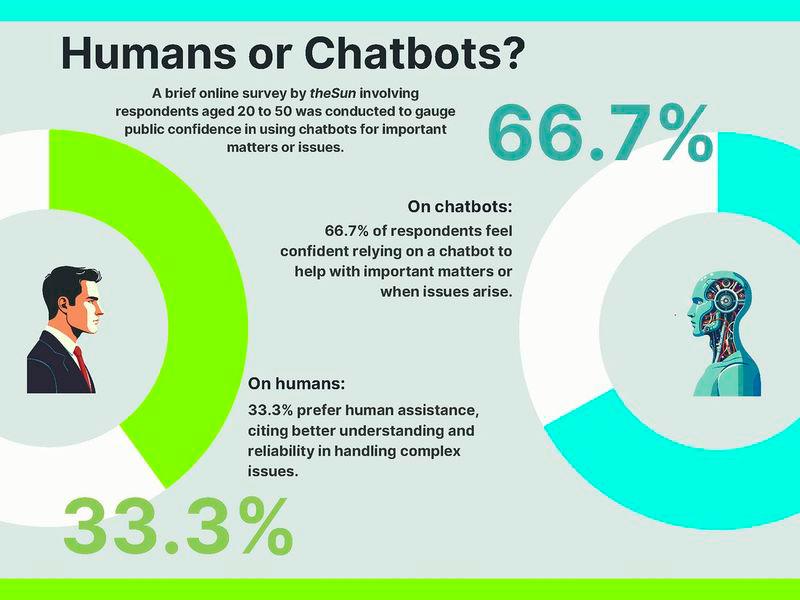PETALING JAYA: Chatbots may be the next big thing in public service delivery but questions linger over whether these AI-powered tools can truly serve the needs of Malaysians.
Universiti Teknikal Malaysia Malacca Faculty of Artificial Intelligence and Cyber Security dean Assoc Prof Dr Muhammad Hafidz Fazli Md Faudi said while chatbots offer instant responses, lighten counter workloads and improve access for tech-savvy users, they should never fully replace conventional services.
“Malaysia is home to a diverse population with varying age groups, educational backgrounds and levels of digital literacy. Senior citizens and rural communities, for instance, may not be comfortable using chatbot systems.
“Therefore, it is crucial for chatbots to support multiple languages such as Malay, English, Mandarin and Tamil, and to feature simple, intuitive interfaces,” he said.
Muhammad Hafidz added that uneven digital infrastructure remains a challenge. In areas with poor internet connectivity or low digital adoption, alternative channels like physical counters and telephone hotlines are still essential.
He also cautioned that chatbots often lack context and empathy in nuanced or urgent situations, making them ill-equipped to handle complex or sensitive cases.
“Transparency is equally important. Users must know when they are interacting with a chatbot and they should always have the option to connect with a human officer. This helps maintain public trust and confidence in the system,” he said.
He stressed that chatbots should serve as the first point of contact for routine enquiries, while ensuring seamless access to human assistance for more complex needs.
“Chatbot technology in Malaysia’s public sector can indeed improve service delivery, but only if designed with inclusivity, flexibility and citizen needs in mind. Rather than replacing humans, chatbots should complement them to ensure everyone benefits from digital transformation.”
Meanwhile, Universiti Malaysia Kelantan Institute for Artificial Intelligence and Big Data associate fellow Dr Fakhitah Ridzuan said AI-powered chatbots are highly effective because they deliver accurate, prompt and concise answers tailored to users’ needs.
“Unlike traditional searches that require navigating multiple resources and sifting through large volumes of information, AI chatbots streamline the process by consolidating relevant data from the datasets they are trained on, saving both time and effort,” she said.
Fakhitah added that one of the biggest advantages of AI chatbots is their ability to process information rapidly and respond within seconds.
She cited AirAsia’s “AskBo” system, which instantly answers queries on bookings, baggage or refunds – often faster than a human representative.
“Chatbots are also ideal for round-the-clock support, especially outside business hours. They excel in managing large volumes of queries simultaneously, such as during peak travel seasons or product launches, where human agents may be overwhelmed.
“However, if a chatbot cannot resolve a refund dispute, a human agent is needed to step in and provide clarity. Otherwise users will only be left frustrated,” she said.
Fakhitah emphasised that chatbots will never fully replace humans in customer or public service, as they cannot handle every scenario, particularly those involving emotions or complex decision-making.
She also warned of ethical and privacy concerns, as chatbots often collect personal data such as queries and preferences to deliver tailored responses.
“If not properly secured, this data could be exposed to breaches or misuse. Many users are also unaware of how their information is used or shared, which becomes especially risky in sensitive situations,” she said.
Fakhitah advised the public to avoid oversharing personal details and to use chatbot services that are transparent about data practices and provide options to opt out of data collection.
“Ultimately, public trust in chatbots depends on context. People are more likely to use them in low-risk situations where accuracy is high. But in complex or sensitive matters such as medical, legal or financial disputes, human expertise remains the preferred choice.”










